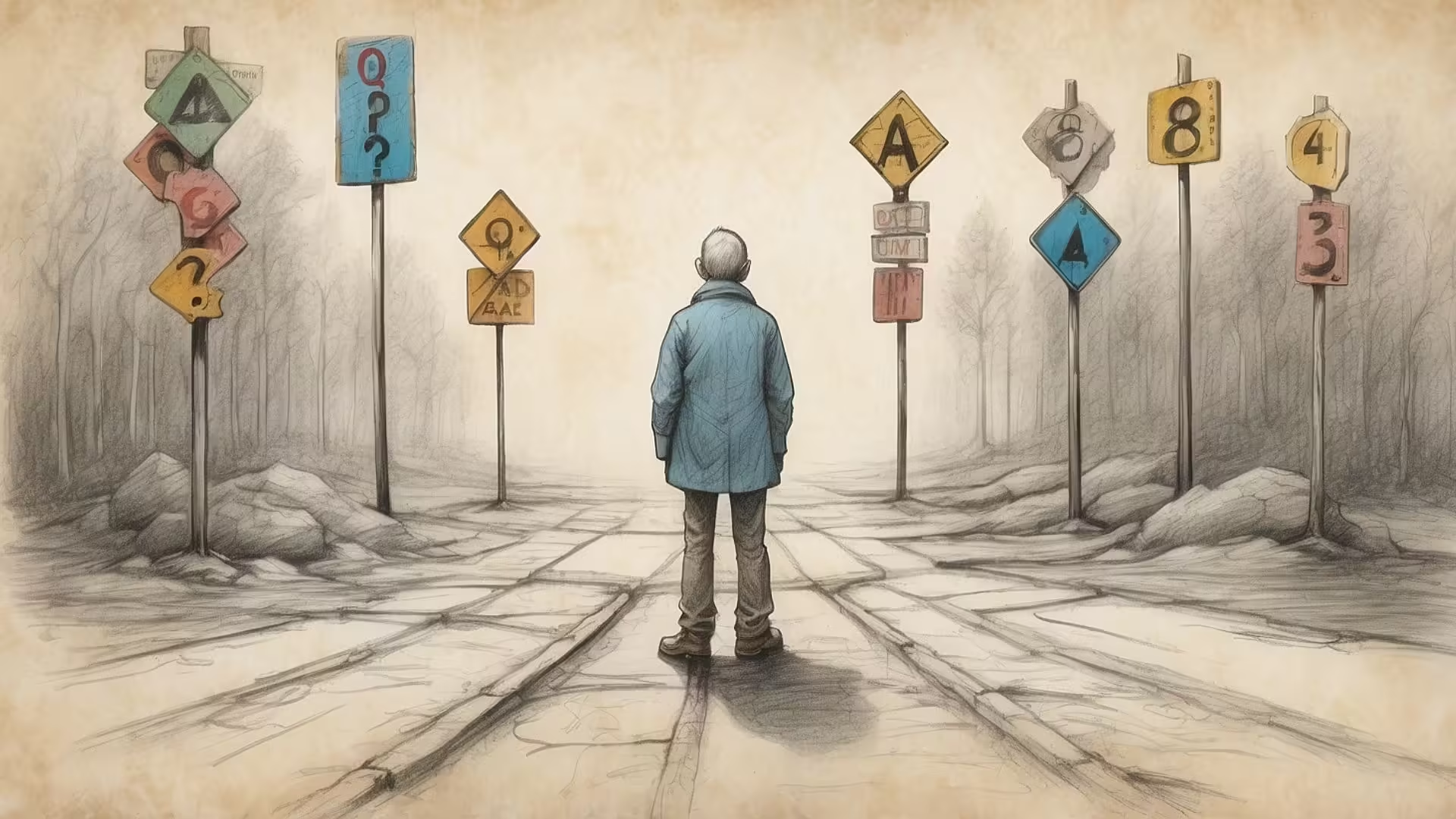The Gist
What Does Quandary Mean?
The word quandary refers to a state of confusion or uncertainty, usually when you have to make a tough decision between two or more options. It’s often used when none of the available choices are ideal, leaving you in a mental struggle. A quandary isn’t just any problem—it’s one that leaves you feeling stuck, unsure of the best course of action. Think of it as being caught between a rock and a hard place, but with a little more sophistication.
Origin and Context of the Word
While the exact origin of the word isn’t entirely clear, it’s believed to have roots in the 16th or 17th century, possibly derived from Latin. Regardless of its origins, the word has found a comfortable place in modern English, often used in both formal and informal situations. Whether you’re making an important career decision or figuring out where to eat dinner, you’ve likely been in a quandary more times than you realize.
How to Use Quandary in Real Life
Quandary is a versatile word that can fit into various conversations. You might say, “I’m in a bit of a quandary about whether to accept the job offer or stay where I am.” It’s a great way to express indecision in a way that feels thoughtful and deliberate. The word can also be used humorously in less serious contexts: “I’m in a quandary—should I order pizza or sushi tonight?” In both cases, it conveys that you’re weighing options, even if the stakes are different.
Related Words and Phrases
If you like the word quandary, there are a few other words and phrases that carry a similar meaning. Words like dilemma, predicament, and conundrum are often used in similar contexts. However, each word carries its own nuance. While a dilemma focuses on two equally unpleasant choices, a quandary emphasizes the mental struggle of indecision. A conundrum, on the other hand, usually refers to a puzzling problem or riddle, adding a touch of mystery to the situation.
Why Knowing This Word Matters
Adding a word like quandary to your vocabulary helps you express yourself more precisely. Instead of saying, “I can’t decide,” you can say, “I’m in a quandary,” which adds depth to your language and makes your communication more engaging. It’s also a word that can make you sound more thoughtful and articulate, especially in situations where you want to express the complexity of your thoughts.
Quandaries in Everyday Life
The next time you’re feeling torn between two options—whether it’s a big life decision or a small everyday choice—remember the word quandary. It’s not just a useful addition to your vocabulary; it’s a perfect way to describe those moments of indecision that we all face. And who knows? Maybe naming your quandaries will help you work through them a little faster.
Let’s Talk
Isn’t it funny how often we find ourselves in a quandary without even realizing it? Life is full of these moments where we’re caught between two or more options, each with its own pros and cons, and no obvious right answer. Think about it—how many times have you stood in front of the fridge, debating whether to eat something healthy or indulge in that leftover cake? Sure, it’s a small example, but it’s a quandary nonetheless. And the truth is, we face these little mental dilemmas every day, from the trivial choices to the ones that can change our lives.
What’s tricky about a quandary is that it’s not just about making a decision—it’s about the feeling that comes with being stuck. You know the one, right? That annoying voice in your head going, “What if I make the wrong choice?” It can be exhausting, especially when both options seem equally valid—or equally bad. It’s like you’re caught in mental quicksand, and the more you try to figure it out, the deeper you sink. I’ve definitely been there, overanalyzing everything from career moves to which movie to watch on a Friday night. Ever find yourself scrolling endlessly through Netflix, paralyzed by too many options? Yep, that’s a Netflix quandary.
But here’s the thing about quandaries—they aren’t necessarily a bad thing. In fact, they’re a sign that you care. If you didn’t care about the outcome, you wouldn’t be in a quandary in the first place, right? That’s the silver lining. It means you’re weighing your options thoughtfully, even if it feels frustrating in the moment. And sometimes, just acknowledging that you’re in a quandary can help ease the pressure. It’s like saying, “Okay, this is hard, but that’s because it matters.”
What I find interesting is how differently people handle their quandaries. Some of us get stuck in analysis paralysis, going over the same pros and cons in our heads a thousand times. Others flip a coin and call it a day, trusting that any decision is better than no decision at all. And then there are those rare people who seem to just know—they trust their gut, make a choice, and never look back. I wish I could say I’m one of those people, but I’ve had my fair share of overthinking sessions. What about you? Are you a careful planner, or do you lean more toward instinct when you’re in a tough spot?
Another thing to consider is that not every quandary needs to be solved right away. Sometimes, taking a step back and giving yourself time to reflect can work wonders. It’s like letting your brain simmer on low heat—eventually, things start to make sense. But on the flip side, there are times when waiting only makes things worse. If you’ve ever put off a decision for so long that the opportunity disappeared, you know exactly what I mean. So the trick is figuring out which approach works best for each situation.
In the end, being in a quandary is just part of being human. Life rarely offers clear-cut answers, and that’s okay. The key is to not let the fear of making the wrong choice keep you from making any choice at all. After all, even if a decision doesn’t go the way you hoped, it’s still a chance to learn something valuable. And who knows? Maybe the act of working through your quandary will reveal options you didn’t even realize were there.
So, what’s your current quandary? Are you facing a tough decision right now, or maybe you’ve just come out of one? How do you usually handle those moments when neither choice feels perfect? It’s worth thinking about, because learning to navigate our quandaries gracefully is a skill that can make life a whole lot easier.
Let’s Learn Vocabulary in Context
Let’s dig into some of the key words and phrases from the conversation about quandaries and see how they work in real life. First up, we’ve got quandary itself. It’s such a great word to describe those moments when you feel stuck between two or more options, none of which seem perfect. It’s not just any old problem—it’s the mental struggle of being unsure what to do. You might say, “I’m in a bit of a quandary about whether to take that new job or stay where I am.” It’s a way to express indecision with a bit more flair than simply saying, “I’m stuck.”
Then there’s analysis paralysis, which describes the frustrating state of overthinking something so much that you end up not making any decision at all. It’s like getting stuck in an endless loop of pros and cons without moving forward. In daily life, you might hear someone say, “I fell into analysis paralysis trying to pick a restaurant, and we ended up eating fast food.” It’s the perfect phrase for those moments when too much thinking becomes counterproductive.
Another useful phrase is caught between a rock and a hard place. This one is a more colorful way of describing a dilemma where neither option seems good. It’s perfect for those situations where you feel trapped no matter which way you turn. Imagine saying, “I was caught between a rock and a hard place—either cancel my vacation or miss an important work meeting.” It’s a vivid way to describe a situation with no easy way out.
Let’s not forget trust your gut. This phrase refers to relying on intuition to make a decision rather than overanalyzing. It’s the advice people give when they think you already know the right answer deep down, even if your brain is second-guessing it. You might hear it in conversations like, “I couldn’t decide what to do, so I just trusted my gut.” It’s a reminder that sometimes, your instincts know best.
We also talked about opportunity disappearing—those times when waiting too long to decide means the choice gets taken away from you. This can happen in small moments, like when you hesitate to buy a concert ticket and it sells out, or in bigger life decisions, like missing out on a job offer because you waited too long to respond. It’s a gentle nudge to remind us that not every quandary can wait forever.
So, what do you think? Do you tend to overthink your decisions and fall into analysis paralysis, or are you more of a “trust your gut” kind of person? And have you ever found yourself caught between a rock and a hard place, unsure which way to go? It’s worth reflecting on because learning how to navigate these mental dilemmas can help us feel more in control, even when the choices aren’t easy.










0 Comments